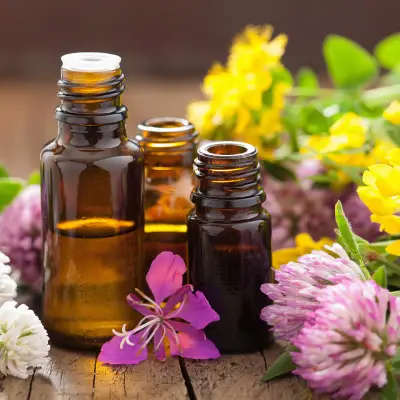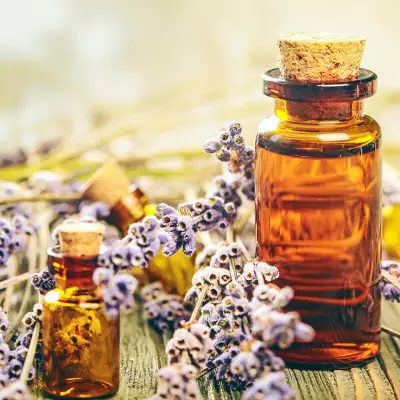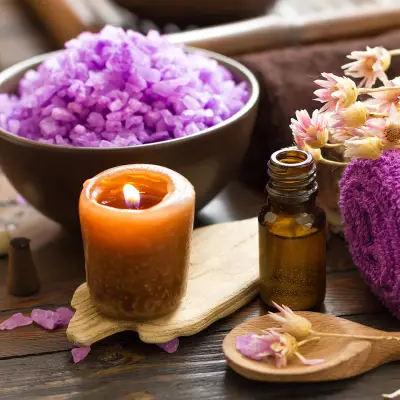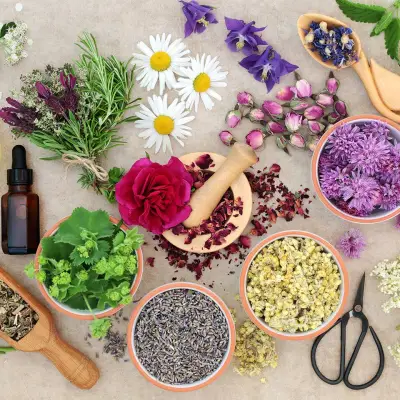Lavender essential oil is more than just a pleasant fragrance. Behind its soothing scent lies a powerful, natural remedy that has been trusted for centuries to ease stress, improve sleep, soothe the skin, and so much more.
Whether you're looking for a natural way to relax, curious about how lavender oil can support your wellbeing, or simply wondering if it’s as effective as people say, you’re in the right place. From everyday uses to important safety tips, here’s what you need to know about making the most of lavender essential oil.
This article is for informational purposes only and is not a substitute for professional medical advice, diagnosis, or treatment.
Jump to:
- What is Lavender Essential Oil?
- What is Lavender Essential Oil Good For?
- The Benefits of Lavender Essential Oil
- How to Use 100% Pure Lavender Essential Oil Safely
- What Are the Side Effects of Lavender Oil?
- Who Shouldn’t Use Lavender?
- When Should You Not Use Lavender Oil?
- Is It Safe to Use Lavender Oil Every Day?
- Common Questions About Lavender Essential Oil Usage
- Study Our Aromatherapy Diploma for £29
Recommended for you!
Best SellersWhat is Lavender Essential Oil?
Lavender essential oil is a concentrated extract taken from the flowers of the lavender plant, known as Lavandula angustifolia. Through steam distillation, the fragrant oils are captured, creating a versatile product widely used in aromatherapy, skincare, and even household care.
The properties of lavender essential oil include calming, anti-inflammatory, antibacterial, and antifungal qualities. These natural properties make it one of the most popular essential oils around the world.
What is Lavender Essential Oil Good For?
From calming the mind to soothing skin irritations, lavender oil is known for its versatility. Some of the most common uses of lavender include:
- Reducing stress and anxiety
- Improving sleep quality
- Supporting skin health
- Easing pain and inflammation
- Promoting hair health
- Freshening the home naturally
The Benefits of Lavender Essential Oil

Let’s take a closer look at the benefits of lavender essential oil and how it can be part of your wellbeing routine.
1. Reduces Stress and Anxiety
One of the most recognised benefits of lavender essential oil is its ability to promote relaxation and ease stress. Used in aromatherapy, lavender’s gentle scent has a calming effect on the nervous system, helping to reduce anxiety and tension. Whether diffused in the air, applied to pulse points, or added to a warm bath, lavender encourages a sense of calm, making it a popular choice for moments of mindfulness, meditation, and simply unwinding after a long day.
Applying diluted lavender oil to areas like the wrists, temples, or the soles of the feet allows the body to absorb its calming properties effectively.
2. Supports Better Sleep
Lavender is widely used to improve sleep quality. Its soothing aroma helps relax both mind and body, making it easier to drift off naturally and enjoy deeper, more restful sleep. Many people incorporate lavender essential oil into their bedtime routine by using a diffuser, adding a drop to their pillow, or applying diluted oil to pulse points.
Using lavender oil regularly in the evening can gently signal to your body that it’s time to wind down, helping to establish healthier sleep patterns.
3. Soothes Skin and Supports Healing
Thanks to its antibacterial, anti-inflammatory, and antifungal properties, lavender oil is a valuable addition to skincare routines. It helps calm irritated skin, reduce redness, and promote the healing of minor cuts, burns, and insect bites. One of the key benefits of lavender essential oil for the skin is its ability to gently address breakouts and blemishes, making it a natural option for those dealing with acne.
Lavender oil should always be diluted with a carrier oil before applying to the skin to prevent irritation, especially for sensitive skin types. Adding a few drops to a warm bath can also nourish the skin while providing a relaxing experience, while applying diluted oil to the feet before sleep promotes relaxation and takes advantage of the skin’s absorbent areas.
4. Eases Pain, Tension, and Muscle Aches
Among the lesser-known health benefits of lavender oil is its natural ability to relieve pain and reduce inflammation. When diluted and massaged into the skin, lavender oil can help ease headaches, muscle soreness, joint stiffness, and digestive discomfort. It’s commonly used to soothe menstrual cramps or abdominal tension by gently rubbing it onto the stomach area.
This natural approach to pain relief makes lavender oil a popular choice for those looking to avoid synthetic alternatives.
5. Promotes Scalp and Hair Health
Lavender oil offers several advantages for hair care. Regular use can improve scalp health, reduce dandruff, and may even encourage hair growth by stimulating circulation to the hair follicles. Adding a few drops of lavender oil to your shampoo or using it in a scalp massage can leave hair feeling fresher and healthier, while also providing a calming aromatic experience.
6. Acts as a Natural Household Freshener and Insect Repellent
The uses of lavender oil extend beyond personal care. Its clean, floral scent makes it a popular natural air freshener for homes, wardrobes, and linens. Lavender oil can be added to spray bottles for a simple, chemical-free way to freshen up living spaces or bedding.
It’s also known for its insect-repelling properties. While not a guaranteed solution, many people use lavender oil to help deter pests, including mosquitoes, moths, and bed bugs.
How to Use 100% Pure Lavender Essential Oil Safely
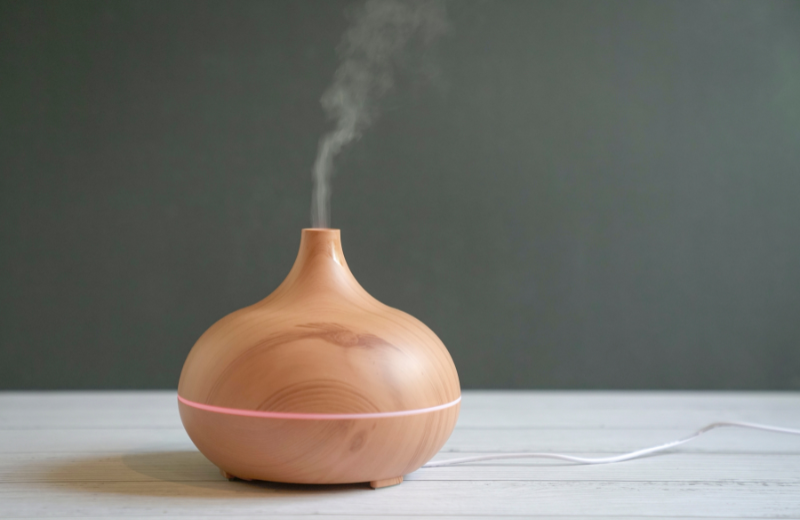
Lavender essential oil is highly concentrated, so using it safely is key to enjoying its many benefits without risking skin irritation or other unwanted effects. Here are some simple and effective ways to incorporate lavender oil into your daily routine:
- Aromatherapy: Add a few drops to a diffuser to fill your space with a calming scent that promotes relaxation, reduces stress, and supports better sleep.
- Topical Application: Always dilute lavender oil with a carrier oil, such as coconut, jojoba, or almond oil, before applying it to the skin. This is ideal for soothing irritated skin, easing muscle tension, or using on pulse points for a calming effect throughout the day.
- Baths: Mix a few drops of lavender oil with a carrier oil or unscented bath gel before adding it to warm bathwater. This creates a relaxing soak that benefits both your skin and your mind.
- Pillow or Room Spray: Combine lavender oil with water in a spray bottle to create a natural mist for your pillow, bedding, or living spaces, helping to encourage relaxation and a peaceful atmosphere.
Pure essential oils should never be applied directly to the skin without dilution, as this can lead to irritation or allergic reactions. Following proper dilution guidelines and performing a patch test ensures that you can enjoy the calming properties of lavender safely and effectively.
What Are the Side Effects of Lavender Oil?
Like any essential oil, lavender can cause side effects in certain situations. Although generally well-tolerated, improper use or sensitivity can lead to unwanted reactions. The most common side effects include:
- Skin Irritation: Applying undiluted lavender oil directly to the skin may cause irritation, particularly in people with sensitive skin.
- Allergic Reactions: Some people may experience itching, rashes, and breathing difficulties due to an allergy to lavender or related plants.
- Hormonal Effects: There is some evidence suggesting that lavender oil may influence hormone levels, particularly in young children.
- Drowsiness: Due to its calming properties, lavender oil can cause excessive drowsiness, especially when combined with sedative medications.
- Digestive Upset: If ingested (which is generally not recommended without professional guidance), lavender oil can lead to nausea, vomiting, or stomach discomfort.
Who Shouldn’t Use Lavender?

Lavender oil is generally safe, but certain groups should be cautious:
- Children and babies, as it may affect hormone levels
- Pregnant or breastfeeding women should consult a healthcare professional
- People with allergies or sensitive skin should always do a patch test
- Those on sedatives or blood pressure medication should check for interactions
When Should You Not Use Lavender Oil?
Lavender oil should be avoided before activities that require full alertness, such as driving or operating machinery, as its calming effects can cause drowsiness. It’s also advisable to avoid using large amounts in enclosed spaces where prolonged inhalation could lead to headaches or dizziness.
Is It Safe to Use Lavender Oil Every Day?
For most adults, daily use of properly diluted lavender oil is safe and can be beneficial, especially for relaxation, skincare, or sleep support. However, moderation is key. Overuse, particularly in high concentrations, may increase the risk of skin sensitivity or other mild side effects over time.
If you’re using lavender essential oil regularly, it’s a good idea to monitor how your body responds and take occasional breaks to avoid potential sensitivity developing.
Recommended for you!
Best SellersCommon Questions About Lavender Essential Oil Usage
How long does it take for lavender oil to work?
When inhaled, the calming effects of lavender oil can often be felt within a few minutes. It works by gently soothing the nervous system, helping to reduce feelings of stress or anxiety. The speed of its effect can vary depending on how it's used and individual sensitivity.
How should you use lavender oil before bed?
Diffuse lavender oil in your bedroom or apply it, diluted with a carrier oil, to your wrists, temples, or feet to help signal to your body that it’s time to relax. The gentle aroma creates a peaceful environment that supports falling asleep more easily. Many people find that making this part of a nightly routine improves overall sleep quality.
Where is the best place to put lavender oil on your body?
Pulse points such as the wrists, neck, behind the ears, and the soles of the feet are ideal for applying diluted lavender oil. These areas enhance absorption and allow the scent to linger, providing ongoing relaxation. Applying to these points can also help ease tension throughout the day.
Can you use lavender oil around the eyes?
Lavender oil should never be applied directly near or on the eyes, as it can cause irritation or discomfort. If you’re looking to relieve tired or strained eyes, a lavender-scented compress placed gently over closed eyelids is a safe alternative. Always ensure that the oil is properly diluted and kept away from direct contact with sensitive areas.
Can you put lavender oil on your bed?
Adding a drop or two of lavender oil to your pillow or bedding can create a calming atmosphere to promote restful sleep. It’s best to dilute it in water or a fabric-safe spray to avoid staining. This simple method is a favourite for those looking to incorporate aromatherapy into their nighttime routine.
What happens if you don’t dilute lavender oil?
Using undiluted lavender oil directly on the skin can lead to redness, or allergic reactions, especially for those with sensitive skin. Essential oils are highly concentrated, so dilution with a carrier oil is important to protect the skin. Always follow recommended guidelines to ensure safe and effective use.
Does lavender oil help with headaches?
Lavender oil is often used to relieve headaches and migraines due to its calming and anti-inflammatory properties. Applying diluted oil to the temples or inhaling the scent can help reduce headache intensity. Many people find it to be a natural and soothing alternative to over-the-counter pain relief.
Can lavender oil be used for anxiety during the day?
Lavender oil can be used throughout the day to manage stress and anxiety by applying it to pulse points or using a personal diffuser. Its calming scent can help maintain a sense of balance and calm during busy or stressful moments. Just a small amount can make a noticeable difference in promoting relaxation without causing drowsiness if used moderately.
Study Our Aromatherapy Diploma for £29
If you're keen to learn more about essential oils and how to use them effectively, why not take your interest further? Our Aromatherapy Diploma Course is the perfect way to deepen your knowledge, whether you're looking to enhance your personal wellbeing or start a new career in holistic therapy. Right now, you can enrol for just £29 using the link below!


